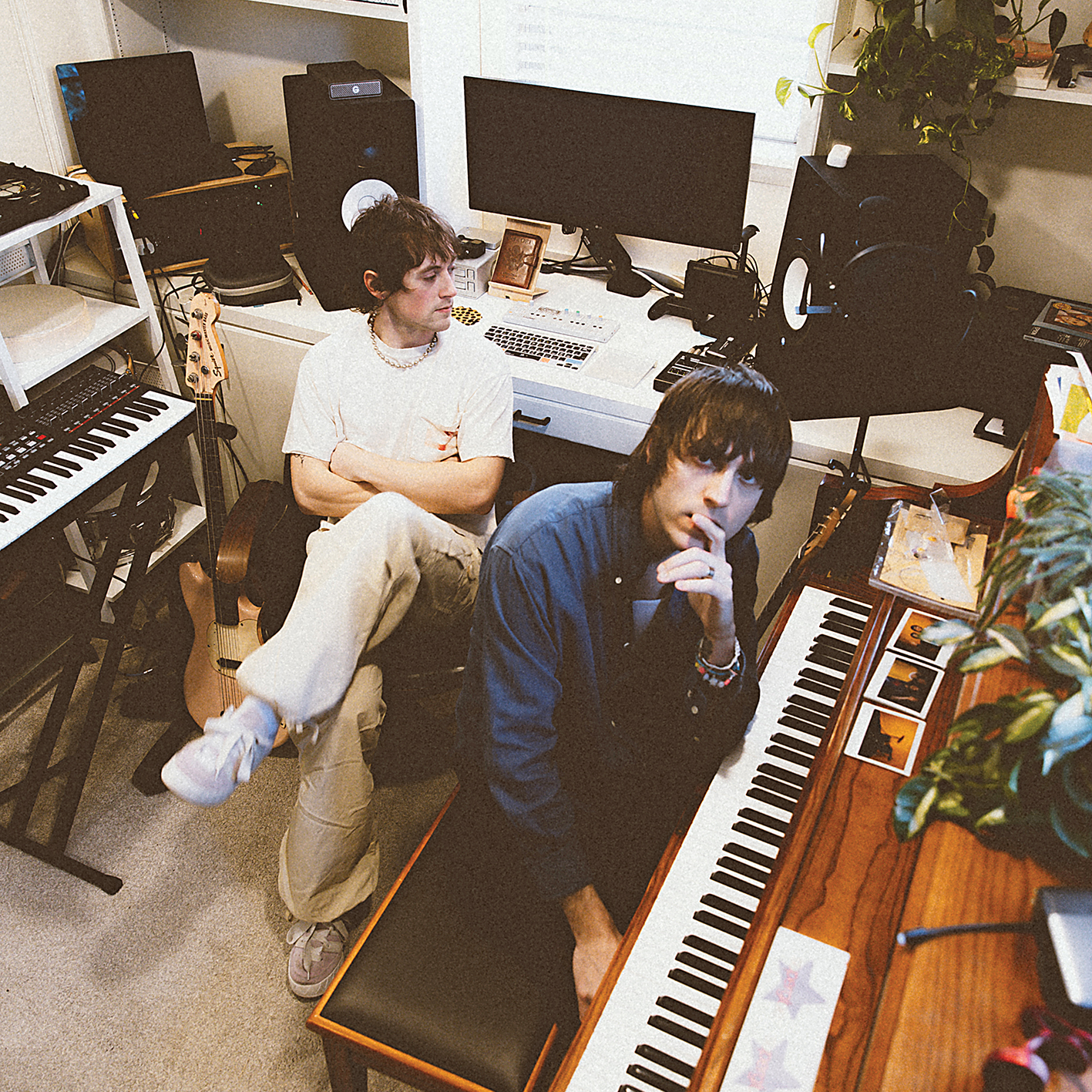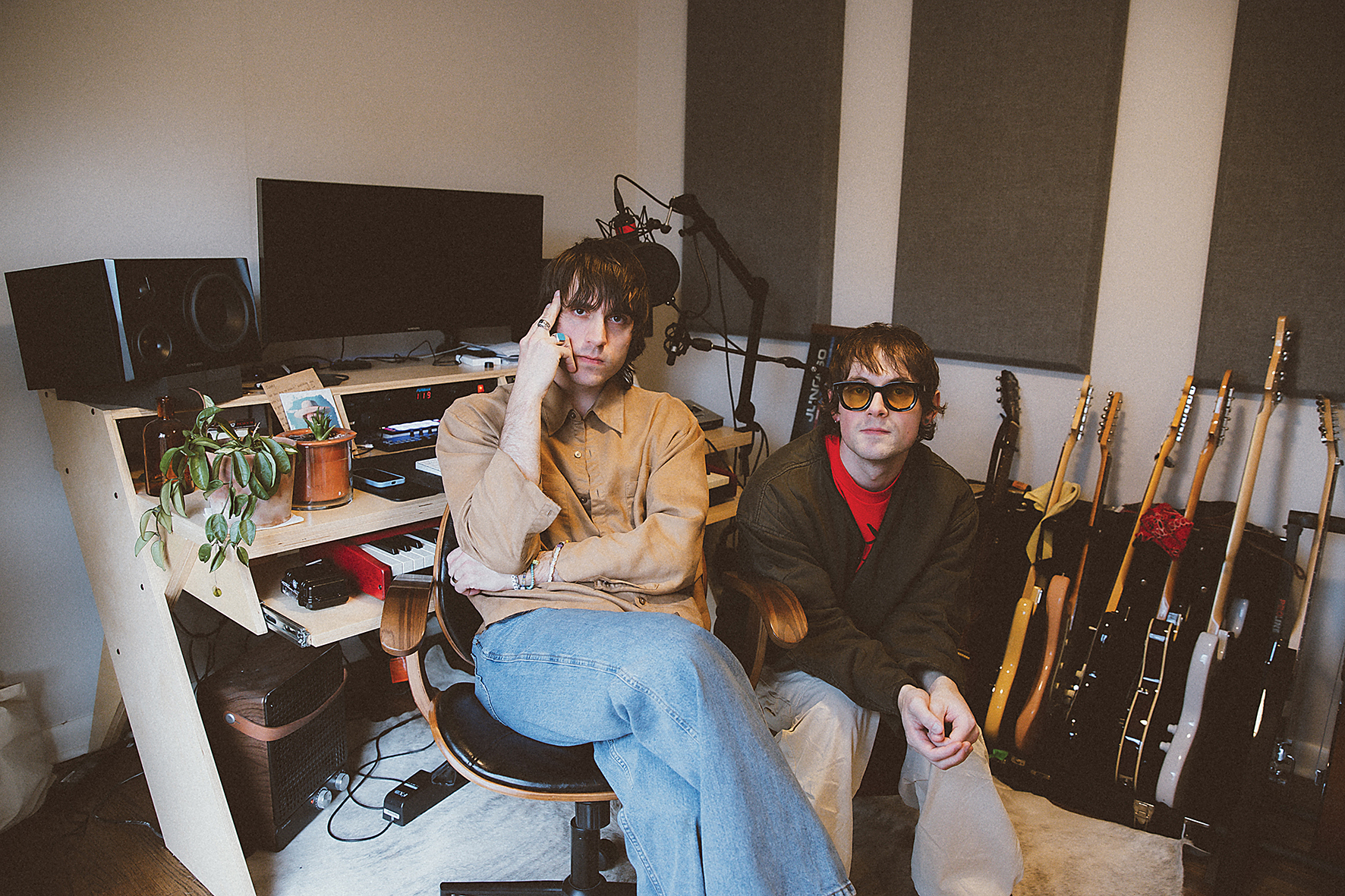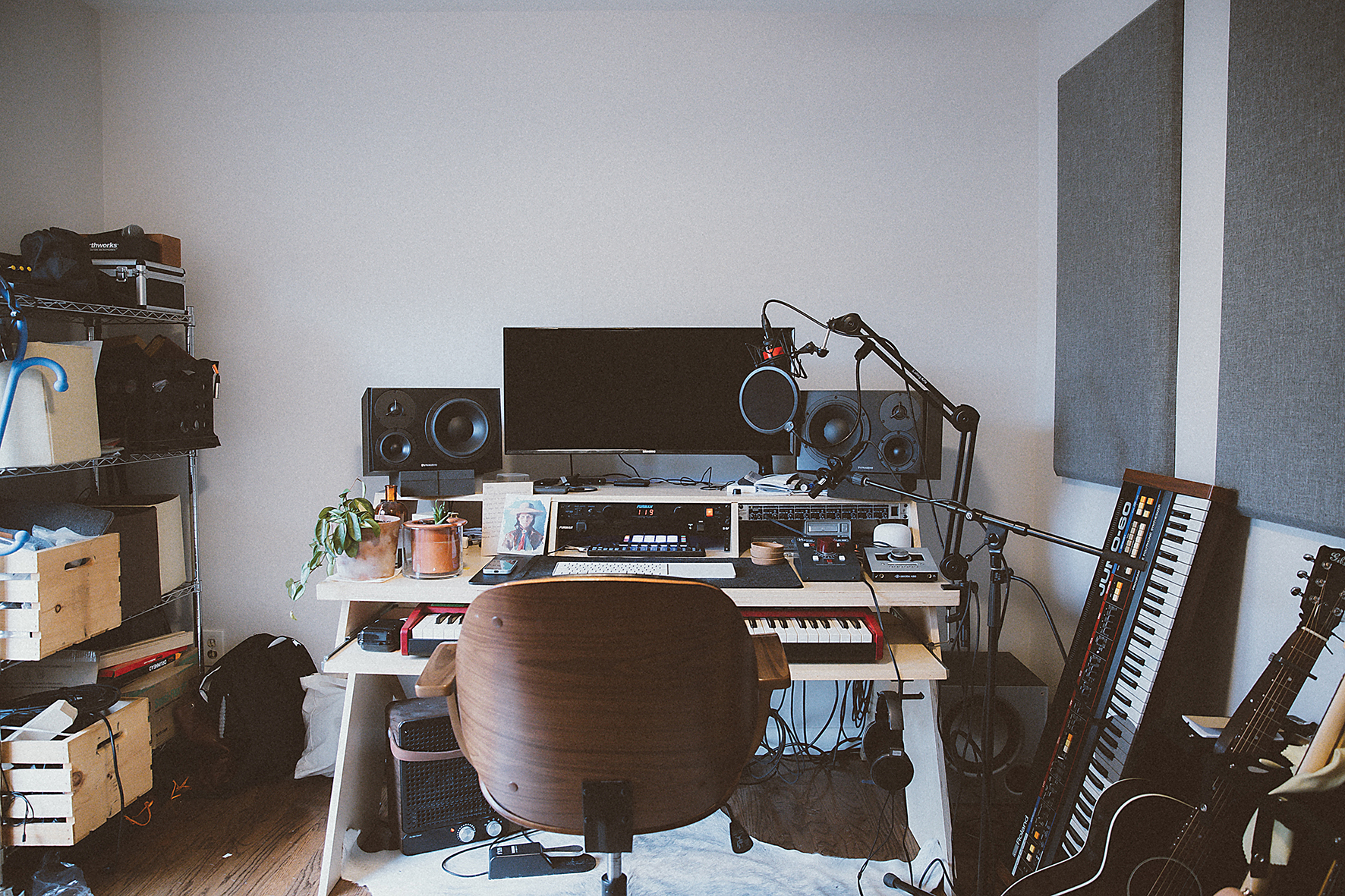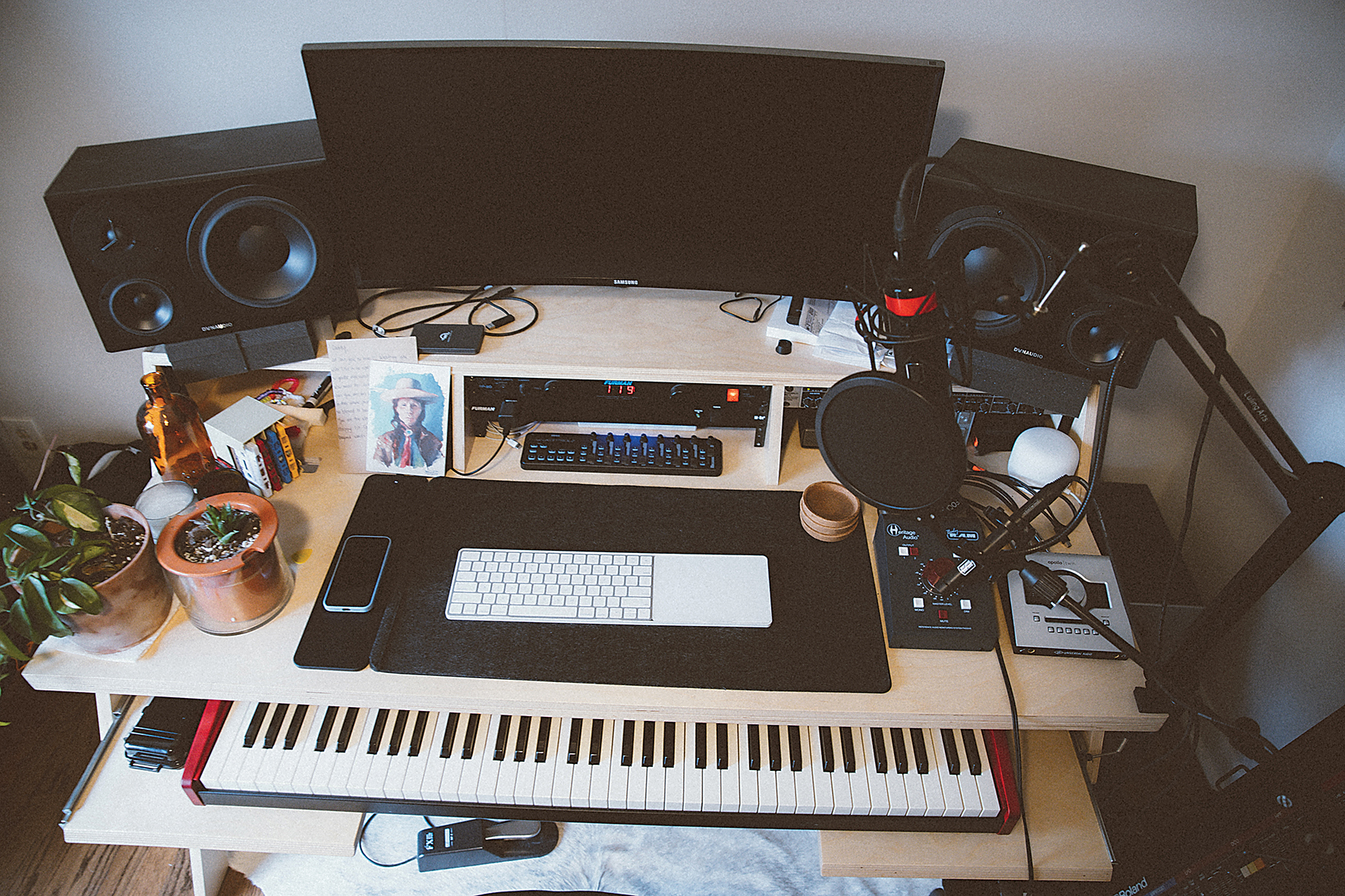How joan recorded a million-streaming debut album in their bedroom: "Every melody matters. If the melody isn’t undeniably singable, the song isn’t going to stick"
With tens of millions of streams, a blossoming global fanbase and a knack for gleaming pop production, Arkansas duo joan are poised to become a very big deal

Once the province of the chart-aimed, teenage pin-ups of the ’90s and 2000s, the brand of pop production of which Little Rock, Arkansas duo joan are masters is centred on big hooks, uplifting choruses, big beats and a spotless sheen.
All of which can be said of the tracks on new album superglue, the pair’s debut album following a run of streaming-only singles which overshot expectations considerably, garnering over 150 million streams globally.
Unlike many of their inspirations, joan are deeply invested in not just writing a topline or two but carefully crafting every millisecond of their productions themselves. The two – vocalist, guitarist and keyboardist Alan Benjamin Thomas and drummer Steven Rutherford – primarily work from Alan’s home studio, and explain that while their sound might initially feel retro on first listen, their ambitions for joan are much bigger. “I think to some degree we’ve taken elements from past decades of music…”
“When we started joan, we started with the love of music that our parents grew up listening to that had been passed down to us. We grabbed a lot of elements of that just to kind of inspire it and put our own modern take on it. Hopefully the sound feels like it’s from the past but also from today,” Alan explains. “We’ve always kind of not been afraid to take certain sounds, like a Juno patch or something and start a song and seeing where it goes. We’ve let ourselves as artists and producers evolve from there. Now we can go wherever we feel like.”

Take me on
Joan’s origins can be traced back to Ouachita Baptist University which they both attended. As Steven recalls: “Alan was studying marketing, I was studying music. We were both in two different bands. We played some shows together. My band produced one of his band’s EPs. It kind of became obvious that both our bands would split as people were graduating and getting real jobs. Steven and I were kind of the anchor points in each band that knew we wanted to do music as our career.”
Alan explains that as other members began pulling out of shows, he and Steven would often play together in order to honour bookings. It was the beginning of a fruitful friendship. “It’s so funny now,” he continues. “When we eventually got together to write, we hit it off as best friends. On our very first writing day, we came up with our very first single, take me on. The rest is history. It’s been non-stop, forward momentum ever since.”
Joan’s path would led to very sudden and quite surprising success. 2018’s debut EP portra spawned several songs, such as the shimmering I loved you first and the barnstorming love somebody like you – both of which reeled in around 20 million streams apiece. A further salvo of EPs followed, each of which attracted more and more new listeners.
Want all the hottest music and gear news, reviews, deals, features and more, direct to your inbox? Sign up here.
When we wrote I loved you first, we said, ‘I’ve not heard anyone do a guitar solo for ages, let’s put one in’
Alan explains what he believes to be the reason for this sudden, meteoric rise: “I think it’s the familiarity and nostalgia element. Even if it’s linked to a sound or an element in a song that reminds you of something. We’ve got some song ideas that are very much in a Bryan Adams-sphere that we’ve never fully developed. When we wrote I loved you first, we said, ‘I’ve not heard anyone do a guitar solo for ages, let’s put one in’.
“We weren’t aiming for the radio particularly, but it just made our hair stand on end. When I hear the solo or melody kick in, it’s a familiarity thing. We have a rather diverse demographic of fans age-wise. We get 15-25 year-olds but we also get people who are my Dad’s age. We have songs that remind my Dad of his childhood. What he grew up on directly influenced me because he introduced it all to me. Same with my mum. But, some of the sounds we’re bringing to young ears are completely new to them.”
Clocking in
Steven explains that work on superglue began a year previous, after the run of successful singles and EPs resulted in a tour that saw the pair perform to 15,000+ capacity venues in Asia. “We knew it was coming, but we didn’t feel like it was the right time prior to that. We just now felt confident in our production and writing skills, as well as who we are as a band.
“To make superglue we pretty much worked nine-to-five every day. Getting in the studio, clocking-in and just going for it. We pretty much put in as much work as we could every single day for eight months. Alan has a studio that is kind of our main working space and I have a drum studio in my basement.”
We used real organic instruments first, then we used all of our synths and effects and tricks to sprinkle on top
In Alan’s bedroom studio, future bangers like buoyant single flowers, the infectious nervous and the cinematic title track superglue were concocted. We ask Alan to talk us through his central hub: “My MacBook Pro M1 is the main workhorse. We’re mostly in-the-box, using a lot of plugins. For monitoring we’re working with Dynaudio LYD 48 3-way midfield speakers. We use a lot of the Slate Mics, the VMS ML-1 – in fact, every mic we own is Slate, we use them for drums, too. We use the Slate VRS8 interfaces to work in tandem with them. They sound awesome.” Joan also harbour a hefty amount of guitars, as well as the aforementioned Roland Juno‑60.
Steven explains that while previous tracks had begun as in-the-box projects, with beats or melodies worked up over time, superglue purposefully found its first form in the real world. Alan explains: “We knew these songs had more of an organic feel than the ones we’d done in the past. [For] this album, we used real organic instruments first, then we used all of our synths and effects and tricks to sprinkle on top.
Our main synth is Spectrasonics Omnisphere – we use that religiously
“I have so many soft-synths and plugins. Our main synth is Spectrasonics Omnisphere – we use that religiously. We also used Keyscape quite a bit. Both of those are all over this record. We like Spectrasonics’ Trillian for the sub-bass stuff, and their Stylus RMX for drum samples. Our song simple opens with a Stylus RMX loop. We heavily use all of the Slate plugins, I’ve also got the Waves Mercury bundle and I used those quite a bit.”
As a Logic user, Steven is enamoured by its Quick Sampler Slice mode, which became a reliable go-to throughout the record. The pair also favour Korg’s M1 and Triton plugins, as well as a newfound appreciation of the sonic wares of UVI. “We have their Juno emulation, their stock presets just sound better than some of the others out there, they’re easy to use” says Steven.
“But, if I had to choose just one plugin to use forever, it’d have to be Omnisphere. It’s got all I’d ever need on it. It has a little bit of everything. If you need hip-hop sounds, it’s there, if you need rock or grimy, dirty bass, it’s there. You can pull everything you want. They update it frequently too with new presets and controls. It’s just superb.”
If the melody is not there and isn’t undeniably singable and memorable then the song is not going to stick
With this arsenal at their disposal, we wonder how and where the hooks come from – do the pair regularly jam ideas or just capture flashes of inspiration on the go? “We don’t really have a ‘formula’ that we follow when writing. We have really studied the Max Martin approach [the ‘melodic math formula’ – essentially building from the melody upwards] and that whole Swedish system of writing. The biggest compliment I can hear is ‘I knew it was joan when I heard it’. I really want people to recognise our sonic stamp.
“If the melody is not there and isn’t undeniably singable and memorable then the song is not going to stick. Every melody matters. With some songs, you hear the chorus and it drops and it’s awesome, but the verse is forgettable. I want every single section of our songs to work even out of context. I think consistency throughout the song is definitely something we chase. I want to be able to pull out an acoustic and play it through and it have just the same effect as the studio version.”
Steven is equally fixated with making sure that each section of a song works together to grab and build the interest of the listener. “With verses and bridges,” he says, “we’ve spent a long time getting them right for the song. Often, when you find the right bridge, it can feel like a huge weight off your shoulders, but the song has needed it this whole time. We had a few years where it just didn’t feel right to have too much thought on structure beyond the main hook, but if a good chorus is followed by a really good second verse, it takes the listener on a fantastic journey.”

Make it pop
Joan is unashamedly in thrall to those acts that so dominated the charts in the early 2000s, with that major label, big pop-gloss ethos applied to every song on the record. We asked Alan how he’d define the pop sound the duo are aiming for, and what are its USPs. “It’s such a convoluted and diverse genre now. When I was growing up in the early 2000s, you could have a Shania Twain country song in the Top 40 next to Enter Sandman by Metallica. It was an interesting time where pop music was wide-ranging. We’ve kind of always wanted to reflect that in joan.
“For me it’s less like a specific ‘sound’ as much as it is something to do with the fidelity – more crispy, more airy. If you listen to our song nervous, it sounds a little brighter in your ear, you’re going to hear the crispiness of it. But if you hear superglue, that’s a bit more warm and analogue. That’s what I think of more. Hooks are also mega-important, as well as an accessible lyric.”

Not enough hands
When asked how superglue’s tracks will translate to the stage, Alan stresses that they’re keen to evolve sections, while keeping it to the spirit of the record. “The fun is in the transitions – we might loop an intro twice or strip back the arrangement a little. We’re really diving into that more on our new tour.
While we’re playing instruments live, we run an Ableton Live rig to fill some of the space. We just don’t have enough hands to do everything we want
“I think this album lends itself a lot more to a live setting. We’re a little more free in a live setting. We’ve been having a lot of fun figuring out how to make the album feel special but the audience get a slightly different experience at each show. While we’re playing instruments live, we run an Ableton Live rig to fill some of the space. We just don’t have enough hands to do everything we want.”
Watching over the Ableton Live rig is Steven at the drum station. “We’ll build the set where it’s like four songs at a time, that go into each other. We spend a long time building a live set so everything feels like it flows,” he explains. “It’s weird pre-programming a set then thinking ‘OK, how much time do we think someone will applaud’, we don’t want to launch tracks too early!”

The glue that binds
Superglue’s tracks present a satisfying showcase of the pair’s talents, but of the 13 featured, the pair share their deepest love for the title track. “That one literally felt like we didn’t even write it,” laughs Alan. “It was just, like, handed to us, almost. When we first got the beat it was a very surreal experience. I feel like simple is great, too – that one puts me in a specific place in my mind, and has that ‘Y2K’ kind of feel to it. It takes me back to that time, both lyrically and production-wise. I can really pinpoint a specific era of my life.”
Steven agrees: “It was probably the first song we started writing for the album; it set the tone for the rest of the album. When we found that sound we realised that the album was going to be worth chasing and we knew what mood we were going for. We wanted there to be a little bit of something for everyone on there. We all go on the same journey – here are some little nuggets of what life might be for all of us.”
For Alan and Steven, the success of their tracks via streaming platforms has brought an audience, and critical adulation, to their door. We wonder what they’d advise anyone wanting to have a self-sustaining career like theirs.
It helps to have some money to invest in yourself – getting a computer, an interface, headphones – but once you’ve got that, you can start producing music
“The first thing I’d say is, you can literally do it anywhere,” Alan explains. “It helps to have some money to invest in yourself – getting a computer, an interface, headphones – but once you’ve got that, you can start producing music. We’re from Little Rock, Arkansas, we’re a small place. There’s no music industry here in the commercial sense, but we’ve been able to do everything we’ve been able to do thus far, and build a really special career that’s still growing. We’ve become an international band, but based in a very small place.”
“I would say the second thing,” Alan continues, “would be not to be afraid to study the tracks that you like. Not just the artist, but the producer and the mixer. Study who made the track. A lot of times, it’s not just the songwriter but it’s a team of people behind it. We’re lucky in that we are that DIY team in a lot of ways for ourselves, but we also have friends who we collaborate with. Find people around you who have that same drive as you and bring them alongside you. It’s more fun to have your friends involved.”
We haven’t had to go anywhere, or move to LA and meet the right people. We just did what we believed in
Steven points out that the internet’s centrality to the modern world means you can start building your career today. “The internet is a really powerful thing, and I think the joy of not having to be anywhere specific means you can start building your career today. Start really figuring out what that means for you – don’t wait for inspiration to come. Now is the time you need to start figuring out what your sound is.
”We just released music, and people from all over the world found that music and really latched onto it. We haven’t had to go anywhere, or move to LA and meet the right people. We just did what we believed in. It’s been a long journey but every piece of it has been meaningful for us. It’s cool to reflect on it and see how it happened for us.”
“We’re not an overnight success,” says Alan. “We’re four years into this and I’m still just as in love with music. It still feels like the first day we got together to write.”



I'm Andy, the Music-Making Ed here at MusicRadar. My work explores both the inner-workings of how music is made, and frequently digs into the history and development of popular music.
Previously the editor of Computer Music, my career has included editing MusicTech magazine and website and writing about music-making and listening for titles such as NME, Classic Pop, Audio Media International, Guitar.com and Uncut.
When I'm not writing about music, I'm making it. I release tracks under the name ALP.